Entrepreneurship Report: Types, Ventures, Skills, and Economic Impact
VerifiedAdded on 2020/12/29
|16
|4837
|468
Report
AI Summary
This report provides a comprehensive overview of entrepreneurship, examining various types of entrepreneurial ventures including small business entrepreneurship, scalable start-up entrepreneurship, large company entrepreneurship, and social entrepreneurship. It explores the similarities and differences between these ventures, focusing on financial goals, risk profiles, employee recruitment, and innovation. The report also delves into the impact of micro and small businesses on the UK economy, highlighting their contributions to GDP, job creation, and infrastructural development, especially in the context of BREXIT. Furthermore, it analyzes the importance of small businesses and start-ups for social economic growth after BREXIT. The report discusses the traits and skills of successful entrepreneurs, using Bill Gates and Mark Zuckerberg as examples, and examines aspects of entrepreneurial personality reflecting motivation and mindset. Finally, it considers how background and experience can both hinder and foster entrepreneurship. The report aims to provide an information booklet for Joe Woods, an IT business entrepreneur, offering insights into the core concepts and practical aspects of entrepreneurship.

Entrepreneurship
Paraphrase This Document
Need a fresh take? Get an instant paraphrase of this document with our AI Paraphraser

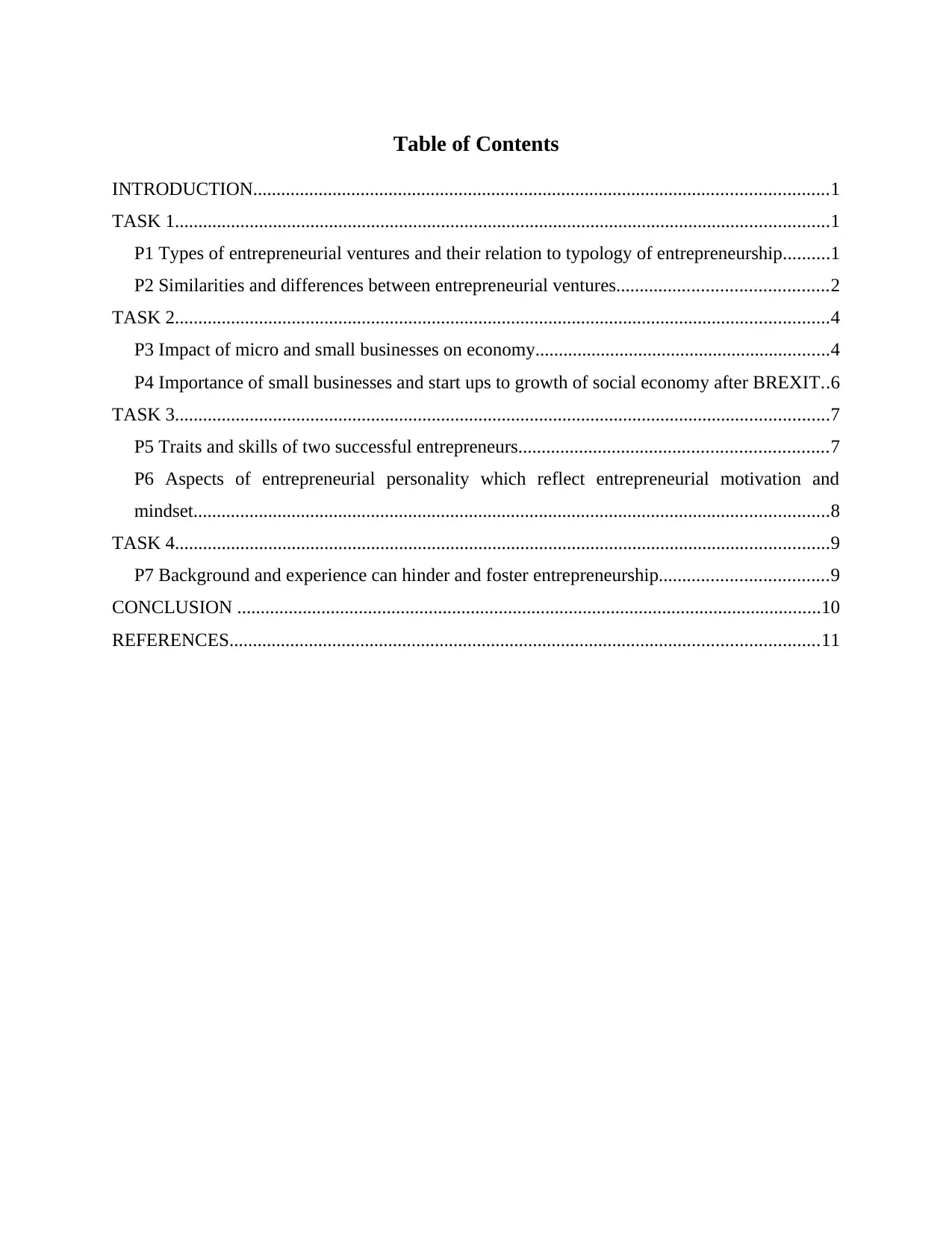
Table of Contents
INTRODUCTION...........................................................................................................................1
TASK 1............................................................................................................................................1
P1 Types of entrepreneurial ventures and their relation to typology of entrepreneurship..........1
P2 Similarities and differences between entrepreneurial ventures.............................................2
TASK 2............................................................................................................................................4
P3 Impact of micro and small businesses on economy...............................................................4
P4 Importance of small businesses and start ups to growth of social economy after BREXIT..6
TASK 3............................................................................................................................................7
P5 Traits and skills of two successful entrepreneurs..................................................................7
P6 Aspects of entrepreneurial personality which reflect entrepreneurial motivation and
mindset........................................................................................................................................8
TASK 4............................................................................................................................................9
P7 Background and experience can hinder and foster entrepreneurship....................................9
CONCLUSION .............................................................................................................................10
REFERENCES..............................................................................................................................11
INTRODUCTION...........................................................................................................................1
TASK 1............................................................................................................................................1
P1 Types of entrepreneurial ventures and their relation to typology of entrepreneurship..........1
P2 Similarities and differences between entrepreneurial ventures.............................................2
TASK 2............................................................................................................................................4
P3 Impact of micro and small businesses on economy...............................................................4
P4 Importance of small businesses and start ups to growth of social economy after BREXIT..6
TASK 3............................................................................................................................................7
P5 Traits and skills of two successful entrepreneurs..................................................................7
P6 Aspects of entrepreneurial personality which reflect entrepreneurial motivation and
mindset........................................................................................................................................8
TASK 4............................................................................................................................................9
P7 Background and experience can hinder and foster entrepreneurship....................................9
CONCLUSION .............................................................................................................................10
REFERENCES..............................................................................................................................11
⊘ This is a preview!⊘
Do you want full access?
Subscribe today to unlock all pages.

Trusted by 1+ million students worldwide
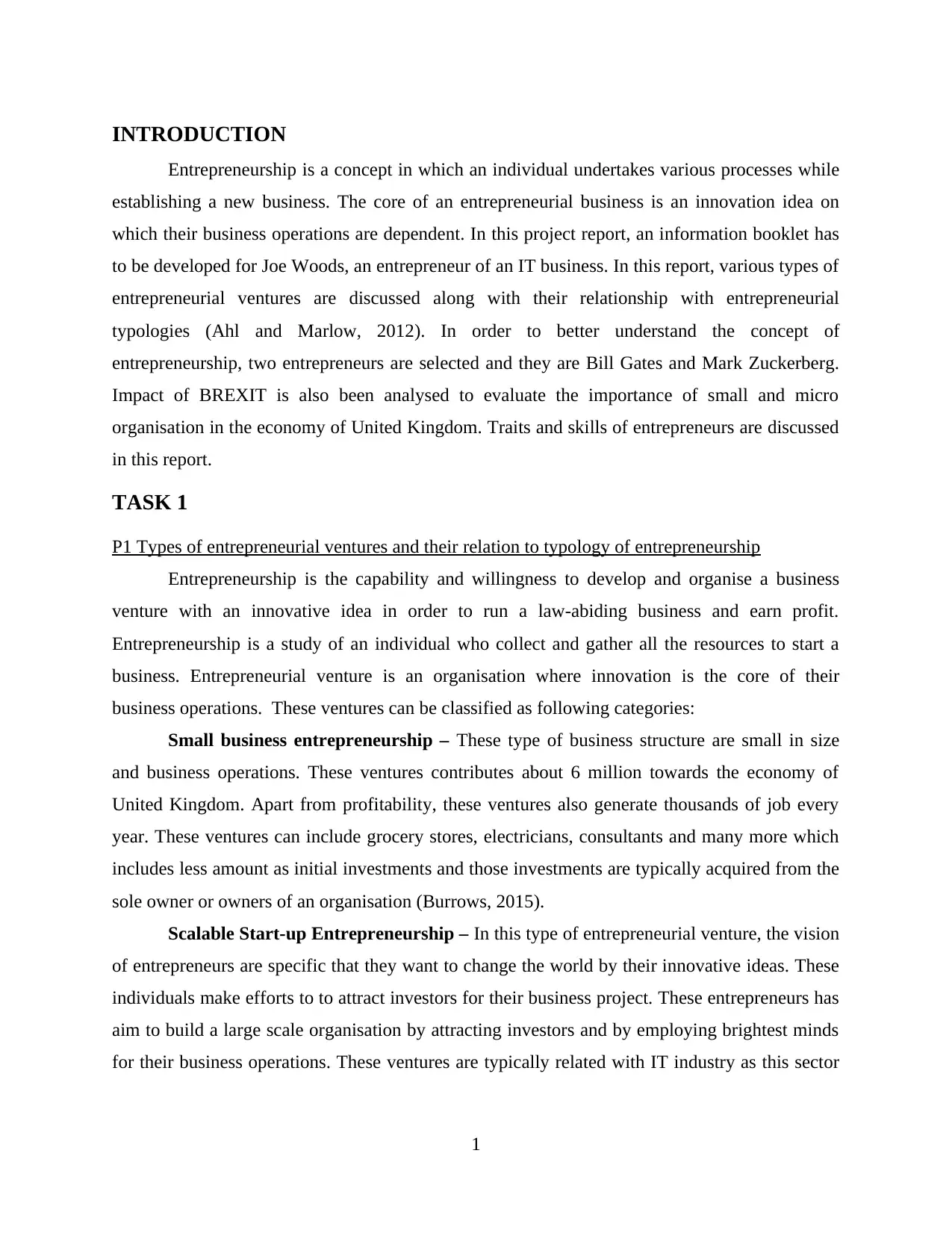
INTRODUCTION
Entrepreneurship is a concept in which an individual undertakes various processes while
establishing a new business. The core of an entrepreneurial business is an innovation idea on
which their business operations are dependent. In this project report, an information booklet has
to be developed for Joe Woods, an entrepreneur of an IT business. In this report, various types of
entrepreneurial ventures are discussed along with their relationship with entrepreneurial
typologies (Ahl and Marlow, 2012). In order to better understand the concept of
entrepreneurship, two entrepreneurs are selected and they are Bill Gates and Mark Zuckerberg.
Impact of BREXIT is also been analysed to evaluate the importance of small and micro
organisation in the economy of United Kingdom. Traits and skills of entrepreneurs are discussed
in this report.
TASK 1
P1 Types of entrepreneurial ventures and their relation to typology of entrepreneurship
Entrepreneurship is the capability and willingness to develop and organise a business
venture with an innovative idea in order to run a law-abiding business and earn profit.
Entrepreneurship is a study of an individual who collect and gather all the resources to start a
business. Entrepreneurial venture is an organisation where innovation is the core of their
business operations. These ventures can be classified as following categories:
Small business entrepreneurship – These type of business structure are small in size
and business operations. These ventures contributes about 6 million towards the economy of
United Kingdom. Apart from profitability, these ventures also generate thousands of job every
year. These ventures can include grocery stores, electricians, consultants and many more which
includes less amount as initial investments and those investments are typically acquired from the
sole owner or owners of an organisation (Burrows, 2015).
Scalable Start-up Entrepreneurship – In this type of entrepreneurial venture, the vision
of entrepreneurs are specific that they want to change the world by their innovative ideas. These
individuals make efforts to to attract investors for their business project. These entrepreneurs has
aim to build a large scale organisation by attracting investors and by employing brightest minds
for their business operations. These ventures are typically related with IT industry as this sector
1
Entrepreneurship is a concept in which an individual undertakes various processes while
establishing a new business. The core of an entrepreneurial business is an innovation idea on
which their business operations are dependent. In this project report, an information booklet has
to be developed for Joe Woods, an entrepreneur of an IT business. In this report, various types of
entrepreneurial ventures are discussed along with their relationship with entrepreneurial
typologies (Ahl and Marlow, 2012). In order to better understand the concept of
entrepreneurship, two entrepreneurs are selected and they are Bill Gates and Mark Zuckerberg.
Impact of BREXIT is also been analysed to evaluate the importance of small and micro
organisation in the economy of United Kingdom. Traits and skills of entrepreneurs are discussed
in this report.
TASK 1
P1 Types of entrepreneurial ventures and their relation to typology of entrepreneurship
Entrepreneurship is the capability and willingness to develop and organise a business
venture with an innovative idea in order to run a law-abiding business and earn profit.
Entrepreneurship is a study of an individual who collect and gather all the resources to start a
business. Entrepreneurial venture is an organisation where innovation is the core of their
business operations. These ventures can be classified as following categories:
Small business entrepreneurship – These type of business structure are small in size
and business operations. These ventures contributes about 6 million towards the economy of
United Kingdom. Apart from profitability, these ventures also generate thousands of job every
year. These ventures can include grocery stores, electricians, consultants and many more which
includes less amount as initial investments and those investments are typically acquired from the
sole owner or owners of an organisation (Burrows, 2015).
Scalable Start-up Entrepreneurship – In this type of entrepreneurial venture, the vision
of entrepreneurs are specific that they want to change the world by their innovative ideas. These
individuals make efforts to to attract investors for their business project. These entrepreneurs has
aim to build a large scale organisation by attracting investors and by employing brightest minds
for their business operations. These ventures are typically related with IT industry as this sector
1
Paraphrase This Document
Need a fresh take? Get an instant paraphrase of this document with our AI Paraphraser
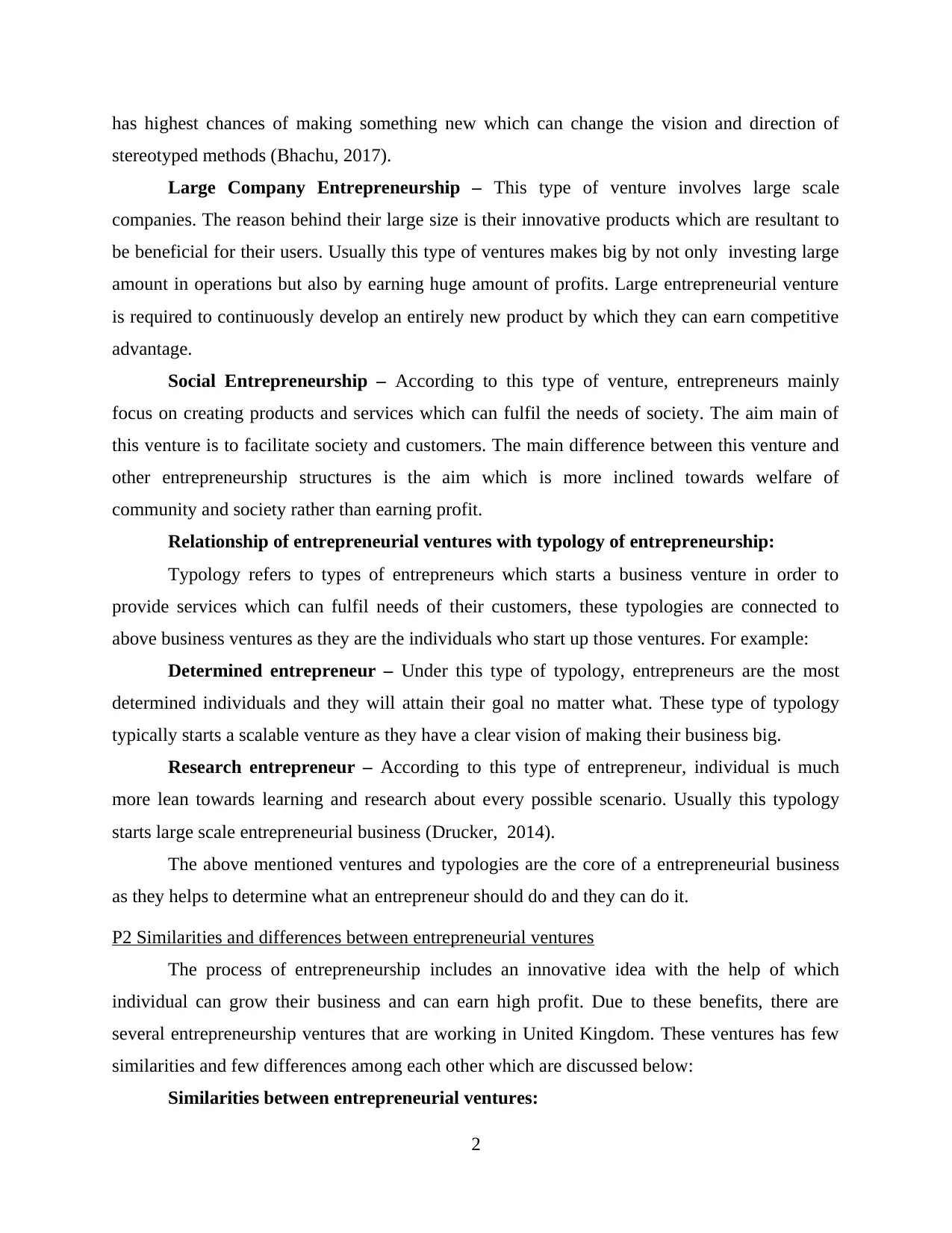
has highest chances of making something new which can change the vision and direction of
stereotyped methods (Bhachu, 2017).
Large Company Entrepreneurship – This type of venture involves large scale
companies. The reason behind their large size is their innovative products which are resultant to
be beneficial for their users. Usually this type of ventures makes big by not only investing large
amount in operations but also by earning huge amount of profits. Large entrepreneurial venture
is required to continuously develop an entirely new product by which they can earn competitive
advantage.
Social Entrepreneurship – According to this type of venture, entrepreneurs mainly
focus on creating products and services which can fulfil the needs of society. The aim main of
this venture is to facilitate society and customers. The main difference between this venture and
other entrepreneurship structures is the aim which is more inclined towards welfare of
community and society rather than earning profit.
Relationship of entrepreneurial ventures with typology of entrepreneurship:
Typology refers to types of entrepreneurs which starts a business venture in order to
provide services which can fulfil needs of their customers, these typologies are connected to
above business ventures as they are the individuals who start up those ventures. For example:
Determined entrepreneur – Under this type of typology, entrepreneurs are the most
determined individuals and they will attain their goal no matter what. These type of typology
typically starts a scalable venture as they have a clear vision of making their business big.
Research entrepreneur – According to this type of entrepreneur, individual is much
more lean towards learning and research about every possible scenario. Usually this typology
starts large scale entrepreneurial business (Drucker, 2014).
The above mentioned ventures and typologies are the core of a entrepreneurial business
as they helps to determine what an entrepreneur should do and they can do it.
P2 Similarities and differences between entrepreneurial ventures
The process of entrepreneurship includes an innovative idea with the help of which
individual can grow their business and can earn high profit. Due to these benefits, there are
several entrepreneurship ventures that are working in United Kingdom. These ventures has few
similarities and few differences among each other which are discussed below:
Similarities between entrepreneurial ventures:
2
stereotyped methods (Bhachu, 2017).
Large Company Entrepreneurship – This type of venture involves large scale
companies. The reason behind their large size is their innovative products which are resultant to
be beneficial for their users. Usually this type of ventures makes big by not only investing large
amount in operations but also by earning huge amount of profits. Large entrepreneurial venture
is required to continuously develop an entirely new product by which they can earn competitive
advantage.
Social Entrepreneurship – According to this type of venture, entrepreneurs mainly
focus on creating products and services which can fulfil the needs of society. The aim main of
this venture is to facilitate society and customers. The main difference between this venture and
other entrepreneurship structures is the aim which is more inclined towards welfare of
community and society rather than earning profit.
Relationship of entrepreneurial ventures with typology of entrepreneurship:
Typology refers to types of entrepreneurs which starts a business venture in order to
provide services which can fulfil needs of their customers, these typologies are connected to
above business ventures as they are the individuals who start up those ventures. For example:
Determined entrepreneur – Under this type of typology, entrepreneurs are the most
determined individuals and they will attain their goal no matter what. These type of typology
typically starts a scalable venture as they have a clear vision of making their business big.
Research entrepreneur – According to this type of entrepreneur, individual is much
more lean towards learning and research about every possible scenario. Usually this typology
starts large scale entrepreneurial business (Drucker, 2014).
The above mentioned ventures and typologies are the core of a entrepreneurial business
as they helps to determine what an entrepreneur should do and they can do it.
P2 Similarities and differences between entrepreneurial ventures
The process of entrepreneurship includes an innovative idea with the help of which
individual can grow their business and can earn high profit. Due to these benefits, there are
several entrepreneurship ventures that are working in United Kingdom. These ventures has few
similarities and few differences among each other which are discussed below:
Similarities between entrepreneurial ventures:
2
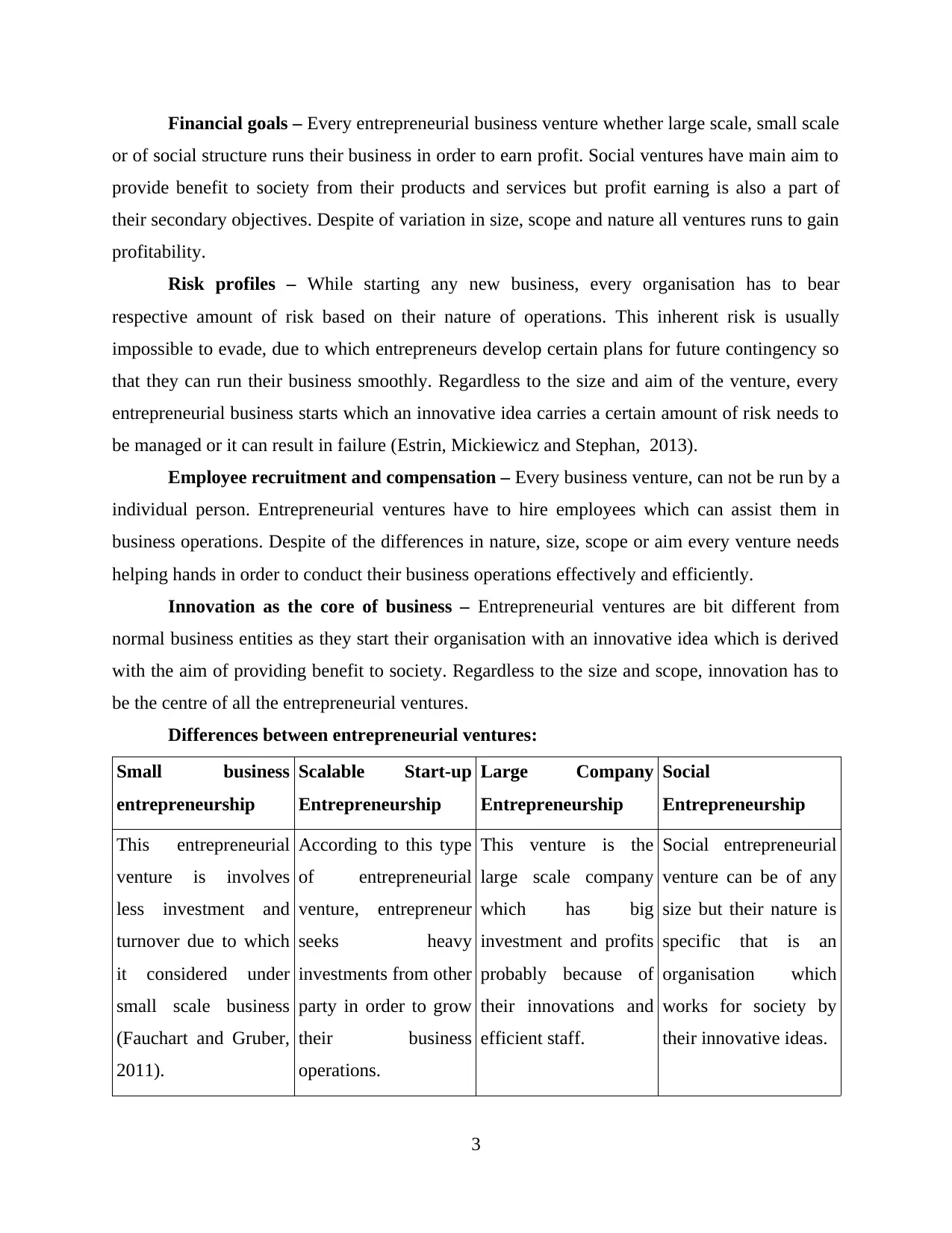
Financial goals – Every entrepreneurial business venture whether large scale, small scale
or of social structure runs their business in order to earn profit. Social ventures have main aim to
provide benefit to society from their products and services but profit earning is also a part of
their secondary objectives. Despite of variation in size, scope and nature all ventures runs to gain
profitability.
Risk profiles – While starting any new business, every organisation has to bear
respective amount of risk based on their nature of operations. This inherent risk is usually
impossible to evade, due to which entrepreneurs develop certain plans for future contingency so
that they can run their business smoothly. Regardless to the size and aim of the venture, every
entrepreneurial business starts which an innovative idea carries a certain amount of risk needs to
be managed or it can result in failure (Estrin, Mickiewicz and Stephan, 2013).
Employee recruitment and compensation – Every business venture, can not be run by a
individual person. Entrepreneurial ventures have to hire employees which can assist them in
business operations. Despite of the differences in nature, size, scope or aim every venture needs
helping hands in order to conduct their business operations effectively and efficiently.
Innovation as the core of business – Entrepreneurial ventures are bit different from
normal business entities as they start their organisation with an innovative idea which is derived
with the aim of providing benefit to society. Regardless to the size and scope, innovation has to
be the centre of all the entrepreneurial ventures.
Differences between entrepreneurial ventures:
Small business
entrepreneurship
Scalable Start-up
Entrepreneurship
Large Company
Entrepreneurship
Social
Entrepreneurship
This entrepreneurial
venture is involves
less investment and
turnover due to which
it considered under
small scale business
(Fauchart and Gruber,
2011).
According to this type
of entrepreneurial
venture, entrepreneur
seeks heavy
investments from other
party in order to grow
their business
operations.
This venture is the
large scale company
which has big
investment and profits
probably because of
their innovations and
efficient staff.
Social entrepreneurial
venture can be of any
size but their nature is
specific that is an
organisation which
works for society by
their innovative ideas.
3
or of social structure runs their business in order to earn profit. Social ventures have main aim to
provide benefit to society from their products and services but profit earning is also a part of
their secondary objectives. Despite of variation in size, scope and nature all ventures runs to gain
profitability.
Risk profiles – While starting any new business, every organisation has to bear
respective amount of risk based on their nature of operations. This inherent risk is usually
impossible to evade, due to which entrepreneurs develop certain plans for future contingency so
that they can run their business smoothly. Regardless to the size and aim of the venture, every
entrepreneurial business starts which an innovative idea carries a certain amount of risk needs to
be managed or it can result in failure (Estrin, Mickiewicz and Stephan, 2013).
Employee recruitment and compensation – Every business venture, can not be run by a
individual person. Entrepreneurial ventures have to hire employees which can assist them in
business operations. Despite of the differences in nature, size, scope or aim every venture needs
helping hands in order to conduct their business operations effectively and efficiently.
Innovation as the core of business – Entrepreneurial ventures are bit different from
normal business entities as they start their organisation with an innovative idea which is derived
with the aim of providing benefit to society. Regardless to the size and scope, innovation has to
be the centre of all the entrepreneurial ventures.
Differences between entrepreneurial ventures:
Small business
entrepreneurship
Scalable Start-up
Entrepreneurship
Large Company
Entrepreneurship
Social
Entrepreneurship
This entrepreneurial
venture is involves
less investment and
turnover due to which
it considered under
small scale business
(Fauchart and Gruber,
2011).
According to this type
of entrepreneurial
venture, entrepreneur
seeks heavy
investments from other
party in order to grow
their business
operations.
This venture is the
large scale company
which has big
investment and profits
probably because of
their innovations and
efficient staff.
Social entrepreneurial
venture can be of any
size but their nature is
specific that is an
organisation which
works for society by
their innovative ideas.
3
⊘ This is a preview!⊘
Do you want full access?
Subscribe today to unlock all pages.

Trusted by 1+ million students worldwide
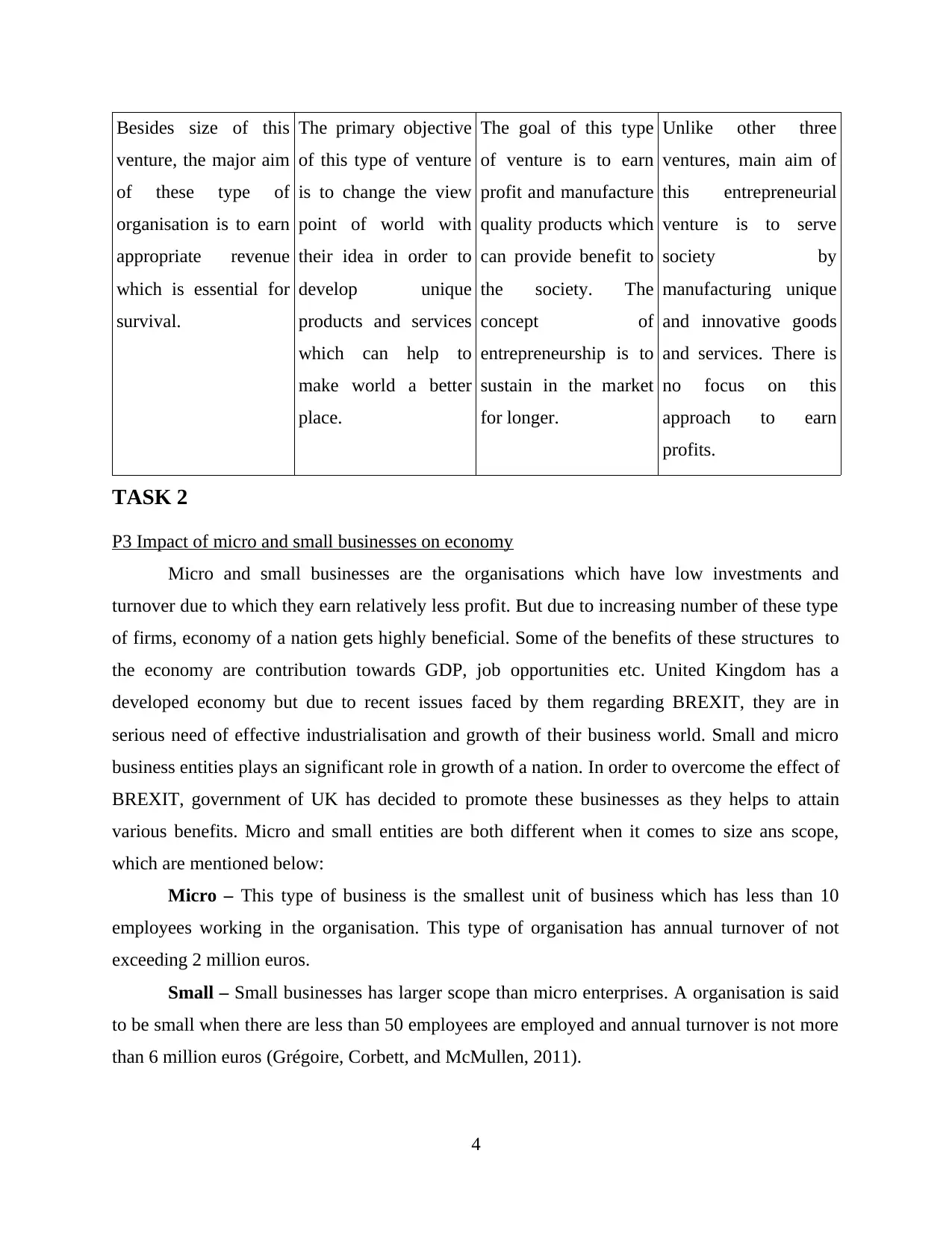
Besides size of this
venture, the major aim
of these type of
organisation is to earn
appropriate revenue
which is essential for
survival.
The primary objective
of this type of venture
is to change the view
point of world with
their idea in order to
develop unique
products and services
which can help to
make world a better
place.
The goal of this type
of venture is to earn
profit and manufacture
quality products which
can provide benefit to
the society. The
concept of
entrepreneurship is to
sustain in the market
for longer.
Unlike other three
ventures, main aim of
this entrepreneurial
venture is to serve
society by
manufacturing unique
and innovative goods
and services. There is
no focus on this
approach to earn
profits.
TASK 2
P3 Impact of micro and small businesses on economy
Micro and small businesses are the organisations which have low investments and
turnover due to which they earn relatively less profit. But due to increasing number of these type
of firms, economy of a nation gets highly beneficial. Some of the benefits of these structures to
the economy are contribution towards GDP, job opportunities etc. United Kingdom has a
developed economy but due to recent issues faced by them regarding BREXIT, they are in
serious need of effective industrialisation and growth of their business world. Small and micro
business entities plays an significant role in growth of a nation. In order to overcome the effect of
BREXIT, government of UK has decided to promote these businesses as they helps to attain
various benefits. Micro and small entities are both different when it comes to size ans scope,
which are mentioned below:
Micro – This type of business is the smallest unit of business which has less than 10
employees working in the organisation. This type of organisation has annual turnover of not
exceeding 2 million euros.
Small – Small businesses has larger scope than micro enterprises. A organisation is said
to be small when there are less than 50 employees are employed and annual turnover is not more
than 6 million euros (Grégoire, Corbett, and McMullen, 2011).
4
venture, the major aim
of these type of
organisation is to earn
appropriate revenue
which is essential for
survival.
The primary objective
of this type of venture
is to change the view
point of world with
their idea in order to
develop unique
products and services
which can help to
make world a better
place.
The goal of this type
of venture is to earn
profit and manufacture
quality products which
can provide benefit to
the society. The
concept of
entrepreneurship is to
sustain in the market
for longer.
Unlike other three
ventures, main aim of
this entrepreneurial
venture is to serve
society by
manufacturing unique
and innovative goods
and services. There is
no focus on this
approach to earn
profits.
TASK 2
P3 Impact of micro and small businesses on economy
Micro and small businesses are the organisations which have low investments and
turnover due to which they earn relatively less profit. But due to increasing number of these type
of firms, economy of a nation gets highly beneficial. Some of the benefits of these structures to
the economy are contribution towards GDP, job opportunities etc. United Kingdom has a
developed economy but due to recent issues faced by them regarding BREXIT, they are in
serious need of effective industrialisation and growth of their business world. Small and micro
business entities plays an significant role in growth of a nation. In order to overcome the effect of
BREXIT, government of UK has decided to promote these businesses as they helps to attain
various benefits. Micro and small entities are both different when it comes to size ans scope,
which are mentioned below:
Micro – This type of business is the smallest unit of business which has less than 10
employees working in the organisation. This type of organisation has annual turnover of not
exceeding 2 million euros.
Small – Small businesses has larger scope than micro enterprises. A organisation is said
to be small when there are less than 50 employees are employed and annual turnover is not more
than 6 million euros (Grégoire, Corbett, and McMullen, 2011).
4
Paraphrase This Document
Need a fresh take? Get an instant paraphrase of this document with our AI Paraphraser

Small and micro enterprises contributes a lot to development of an economy. A chart
presenting graphical representation of SMEs and their contribution towards the economy of UK
is depicted below:
(Source: Contribution of SMEs towards UK economy, 2018)
Above is the statistical information about contribution of SMEs towards economy of
United Kingdom which shows an increasing trend. From the year 2008 to 2017-18, it has been
seen that contribution of SMEs towards UK economy is continuously growing and was at peak
in the year 2015.
Contribution of Micro and small business on growth of economy of UK:
There are few other benefits that economy of UK is enjoying besides increase in GDP.
Some of these contributions impacting national and regional economy of UK are mentioned
below:
Job opportunities – Small and micro companies are huge in number and has to employ
numerous employees which helps in creating employment in the economy of united Kingdom.
Over 50 percent of the job opportunities are generated by these organisations. This role of small
and micro enterprises helps to evade problem of unemployment (Kiss, Danis and Cavusgil,
2012).
5
presenting graphical representation of SMEs and their contribution towards the economy of UK
is depicted below:
(Source: Contribution of SMEs towards UK economy, 2018)
Above is the statistical information about contribution of SMEs towards economy of
United Kingdom which shows an increasing trend. From the year 2008 to 2017-18, it has been
seen that contribution of SMEs towards UK economy is continuously growing and was at peak
in the year 2015.
Contribution of Micro and small business on growth of economy of UK:
There are few other benefits that economy of UK is enjoying besides increase in GDP.
Some of these contributions impacting national and regional economy of UK are mentioned
below:
Job opportunities – Small and micro companies are huge in number and has to employ
numerous employees which helps in creating employment in the economy of united Kingdom.
Over 50 percent of the job opportunities are generated by these organisations. This role of small
and micro enterprises helps to evade problem of unemployment (Kiss, Danis and Cavusgil,
2012).
5
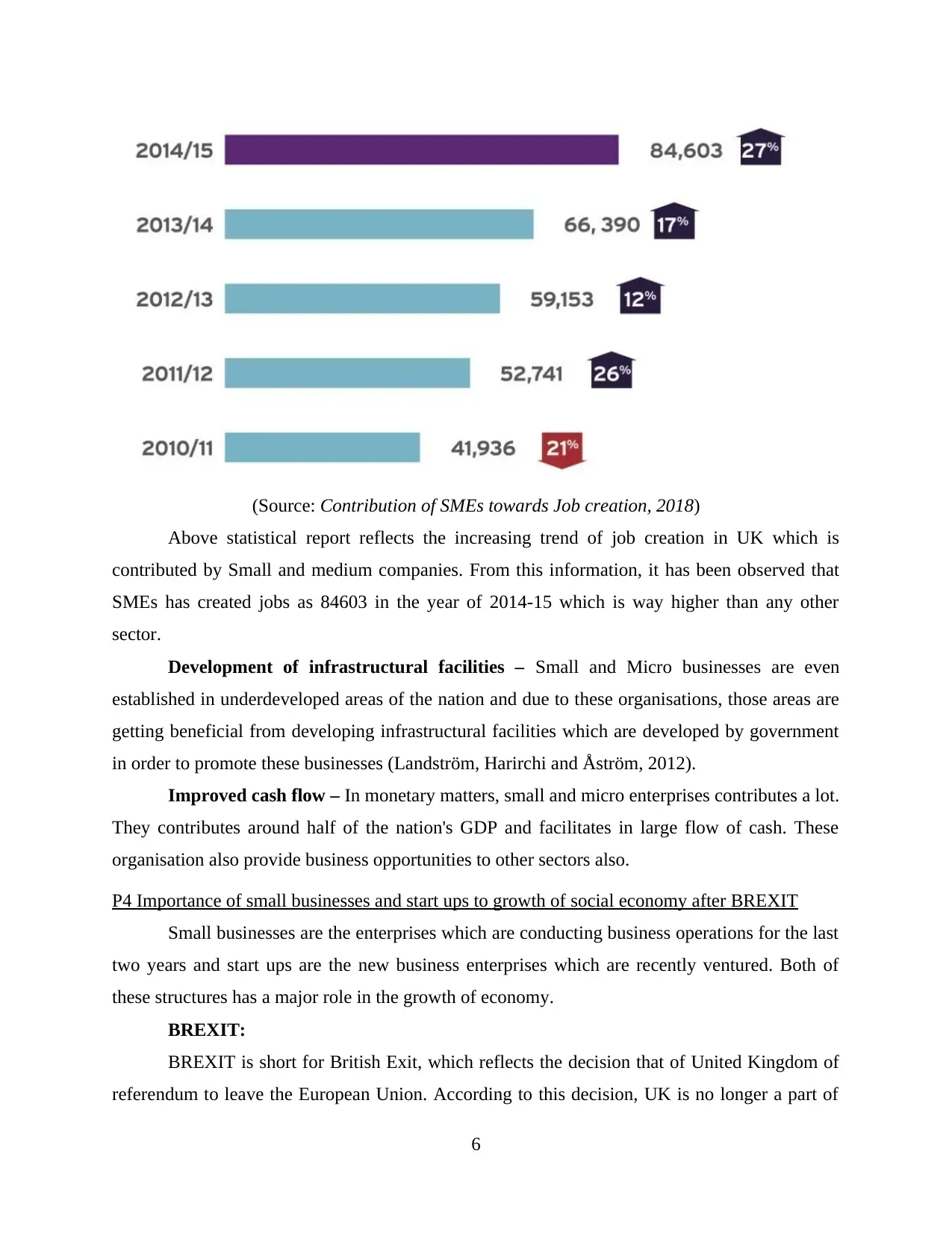
(Source: Contribution of SMEs towards Job creation, 2018)
Above statistical report reflects the increasing trend of job creation in UK which is
contributed by Small and medium companies. From this information, it has been observed that
SMEs has created jobs as 84603 in the year of 2014-15 which is way higher than any other
sector.
Development of infrastructural facilities – Small and Micro businesses are even
established in underdeveloped areas of the nation and due to these organisations, those areas are
getting beneficial from developing infrastructural facilities which are developed by government
in order to promote these businesses (Landström, Harirchi and Åström, 2012).
Improved cash flow – In monetary matters, small and micro enterprises contributes a lot.
They contributes around half of the nation's GDP and facilitates in large flow of cash. These
organisation also provide business opportunities to other sectors also.
P4 Importance of small businesses and start ups to growth of social economy after BREXIT
Small businesses are the enterprises which are conducting business operations for the last
two years and start ups are the new business enterprises which are recently ventured. Both of
these structures has a major role in the growth of economy.
BREXIT:
BREXIT is short for British Exit, which reflects the decision that of United Kingdom of
referendum to leave the European Union. According to this decision, UK is no longer a part of
6
Above statistical report reflects the increasing trend of job creation in UK which is
contributed by Small and medium companies. From this information, it has been observed that
SMEs has created jobs as 84603 in the year of 2014-15 which is way higher than any other
sector.
Development of infrastructural facilities – Small and Micro businesses are even
established in underdeveloped areas of the nation and due to these organisations, those areas are
getting beneficial from developing infrastructural facilities which are developed by government
in order to promote these businesses (Landström, Harirchi and Åström, 2012).
Improved cash flow – In monetary matters, small and micro enterprises contributes a lot.
They contributes around half of the nation's GDP and facilitates in large flow of cash. These
organisation also provide business opportunities to other sectors also.
P4 Importance of small businesses and start ups to growth of social economy after BREXIT
Small businesses are the enterprises which are conducting business operations for the last
two years and start ups are the new business enterprises which are recently ventured. Both of
these structures has a major role in the growth of economy.
BREXIT:
BREXIT is short for British Exit, which reflects the decision that of United Kingdom of
referendum to leave the European Union. According to this decision, UK is no longer a part of
6
⊘ This is a preview!⊘
Do you want full access?
Subscribe today to unlock all pages.

Trusted by 1+ million students worldwide
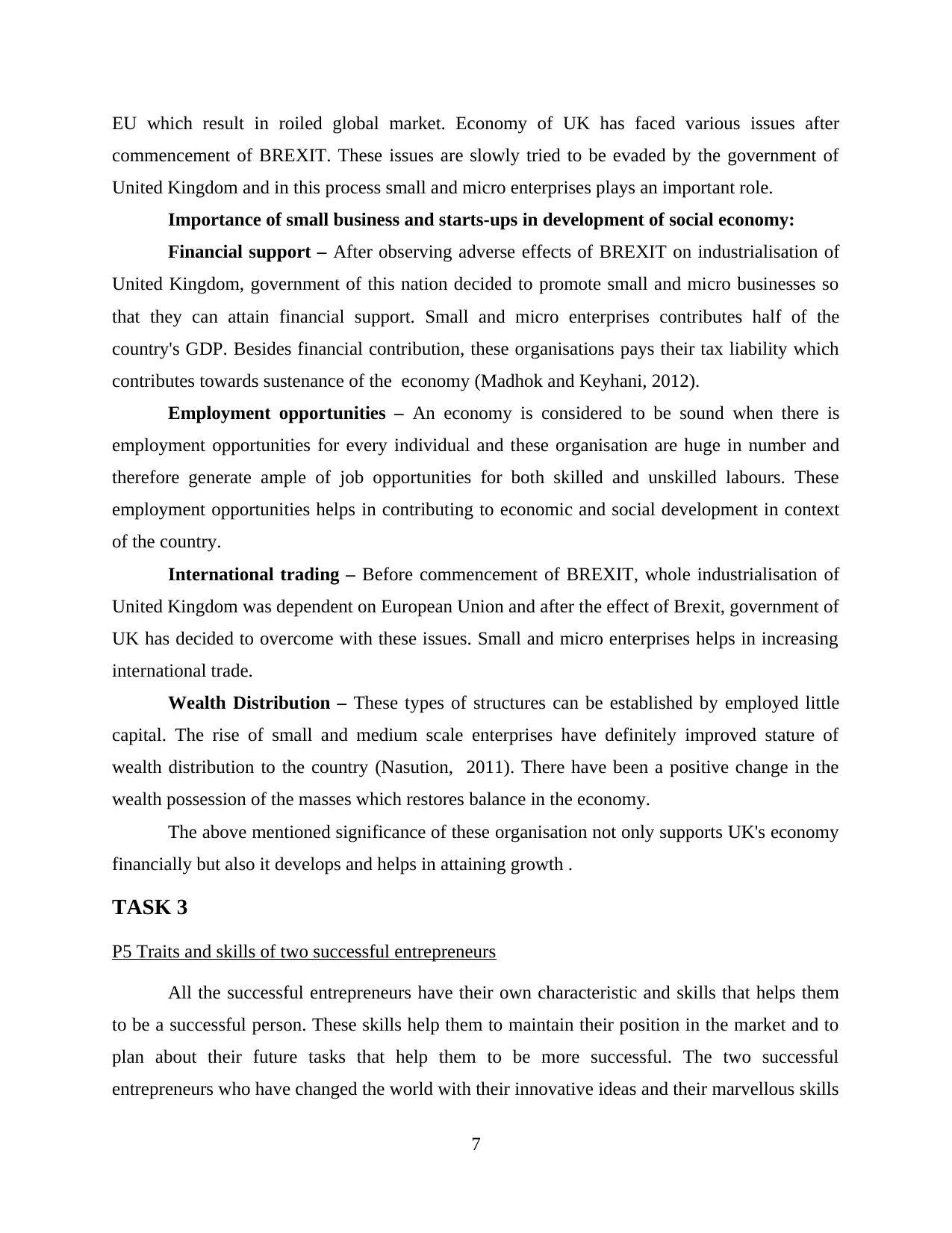
EU which result in roiled global market. Economy of UK has faced various issues after
commencement of BREXIT. These issues are slowly tried to be evaded by the government of
United Kingdom and in this process small and micro enterprises plays an important role.
Importance of small business and starts-ups in development of social economy:
Financial support – After observing adverse effects of BREXIT on industrialisation of
United Kingdom, government of this nation decided to promote small and micro businesses so
that they can attain financial support. Small and micro enterprises contributes half of the
country's GDP. Besides financial contribution, these organisations pays their tax liability which
contributes towards sustenance of the economy (Madhok and Keyhani, 2012).
Employment opportunities – An economy is considered to be sound when there is
employment opportunities for every individual and these organisation are huge in number and
therefore generate ample of job opportunities for both skilled and unskilled labours. These
employment opportunities helps in contributing to economic and social development in context
of the country.
International trading – Before commencement of BREXIT, whole industrialisation of
United Kingdom was dependent on European Union and after the effect of Brexit, government of
UK has decided to overcome with these issues. Small and micro enterprises helps in increasing
international trade.
Wealth Distribution – These types of structures can be established by employed little
capital. The rise of small and medium scale enterprises have definitely improved stature of
wealth distribution to the country (Nasution, 2011). There have been a positive change in the
wealth possession of the masses which restores balance in the economy.
The above mentioned significance of these organisation not only supports UK's economy
financially but also it develops and helps in attaining growth .
TASK 3
P5 Traits and skills of two successful entrepreneurs
All the successful entrepreneurs have their own characteristic and skills that helps them
to be a successful person. These skills help them to maintain their position in the market and to
plan about their future tasks that help them to be more successful. The two successful
entrepreneurs who have changed the world with their innovative ideas and their marvellous skills
7
commencement of BREXIT. These issues are slowly tried to be evaded by the government of
United Kingdom and in this process small and micro enterprises plays an important role.
Importance of small business and starts-ups in development of social economy:
Financial support – After observing adverse effects of BREXIT on industrialisation of
United Kingdom, government of this nation decided to promote small and micro businesses so
that they can attain financial support. Small and micro enterprises contributes half of the
country's GDP. Besides financial contribution, these organisations pays their tax liability which
contributes towards sustenance of the economy (Madhok and Keyhani, 2012).
Employment opportunities – An economy is considered to be sound when there is
employment opportunities for every individual and these organisation are huge in number and
therefore generate ample of job opportunities for both skilled and unskilled labours. These
employment opportunities helps in contributing to economic and social development in context
of the country.
International trading – Before commencement of BREXIT, whole industrialisation of
United Kingdom was dependent on European Union and after the effect of Brexit, government of
UK has decided to overcome with these issues. Small and micro enterprises helps in increasing
international trade.
Wealth Distribution – These types of structures can be established by employed little
capital. The rise of small and medium scale enterprises have definitely improved stature of
wealth distribution to the country (Nasution, 2011). There have been a positive change in the
wealth possession of the masses which restores balance in the economy.
The above mentioned significance of these organisation not only supports UK's economy
financially but also it develops and helps in attaining growth .
TASK 3
P5 Traits and skills of two successful entrepreneurs
All the successful entrepreneurs have their own characteristic and skills that helps them
to be a successful person. These skills help them to maintain their position in the market and to
plan about their future tasks that help them to be more successful. The two successful
entrepreneurs who have changed the world with their innovative ideas and their marvellous skills
7
Paraphrase This Document
Need a fresh take? Get an instant paraphrase of this document with our AI Paraphraser
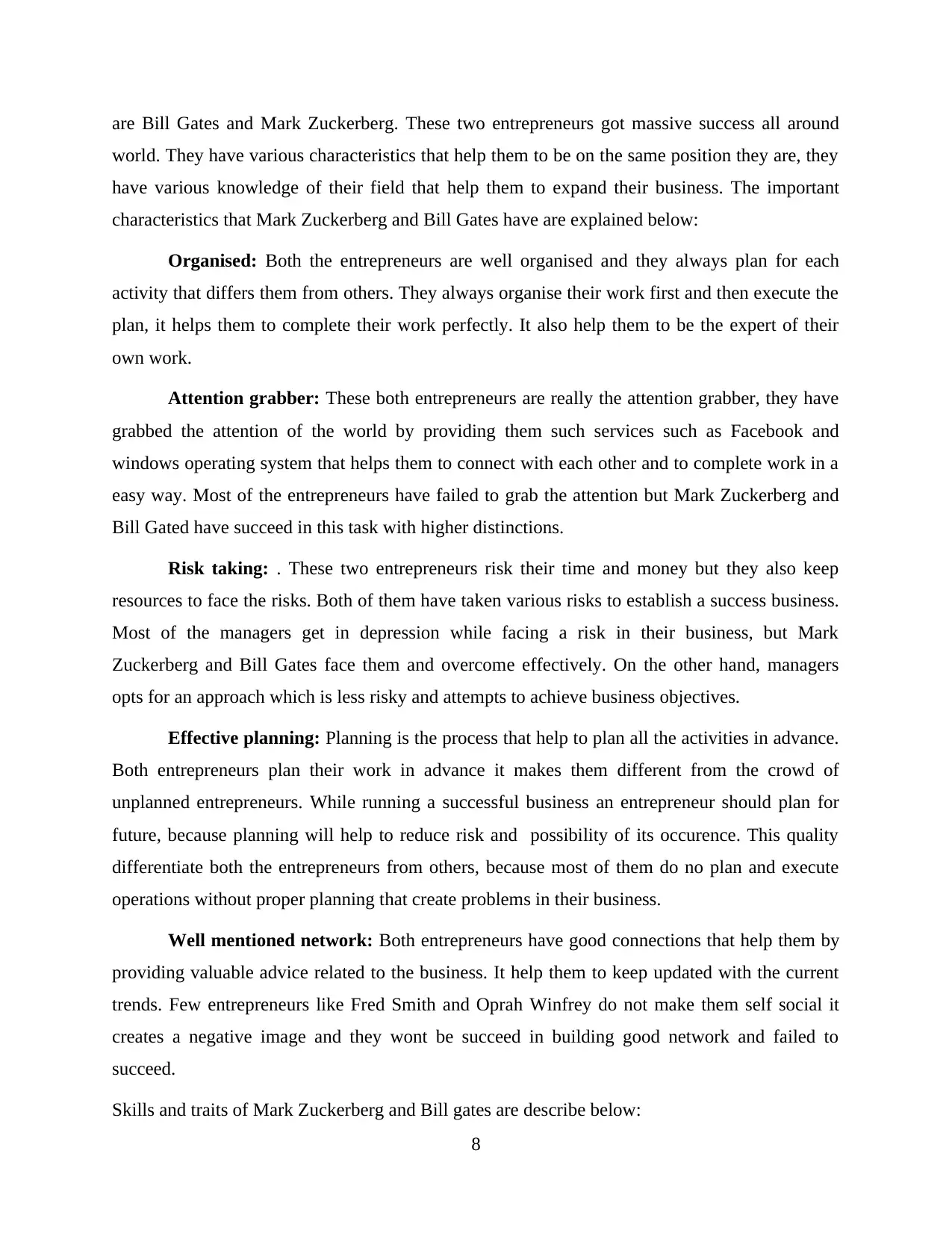
are Bill Gates and Mark Zuckerberg. These two entrepreneurs got massive success all around
world. They have various characteristics that help them to be on the same position they are, they
have various knowledge of their field that help them to expand their business. The important
characteristics that Mark Zuckerberg and Bill Gates have are explained below:
Organised: Both the entrepreneurs are well organised and they always plan for each
activity that differs them from others. They always organise their work first and then execute the
plan, it helps them to complete their work perfectly. It also help them to be the expert of their
own work.
Attention grabber: These both entrepreneurs are really the attention grabber, they have
grabbed the attention of the world by providing them such services such as Facebook and
windows operating system that helps them to connect with each other and to complete work in a
easy way. Most of the entrepreneurs have failed to grab the attention but Mark Zuckerberg and
Bill Gated have succeed in this task with higher distinctions.
Risk taking: . These two entrepreneurs risk their time and money but they also keep
resources to face the risks. Both of them have taken various risks to establish a success business.
Most of the managers get in depression while facing a risk in their business, but Mark
Zuckerberg and Bill Gates face them and overcome effectively. On the other hand, managers
opts for an approach which is less risky and attempts to achieve business objectives.
Effective planning: Planning is the process that help to plan all the activities in advance.
Both entrepreneurs plan their work in advance it makes them different from the crowd of
unplanned entrepreneurs. While running a successful business an entrepreneur should plan for
future, because planning will help to reduce risk and possibility of its occurence. This quality
differentiate both the entrepreneurs from others, because most of them do no plan and execute
operations without proper planning that create problems in their business.
Well mentioned network: Both entrepreneurs have good connections that help them by
providing valuable advice related to the business. It help them to keep updated with the current
trends. Few entrepreneurs like Fred Smith and Oprah Winfrey do not make them self social it
creates a negative image and they wont be succeed in building good network and failed to
succeed.
Skills and traits of Mark Zuckerberg and Bill gates are describe below:
8
world. They have various characteristics that help them to be on the same position they are, they
have various knowledge of their field that help them to expand their business. The important
characteristics that Mark Zuckerberg and Bill Gates have are explained below:
Organised: Both the entrepreneurs are well organised and they always plan for each
activity that differs them from others. They always organise their work first and then execute the
plan, it helps them to complete their work perfectly. It also help them to be the expert of their
own work.
Attention grabber: These both entrepreneurs are really the attention grabber, they have
grabbed the attention of the world by providing them such services such as Facebook and
windows operating system that helps them to connect with each other and to complete work in a
easy way. Most of the entrepreneurs have failed to grab the attention but Mark Zuckerberg and
Bill Gated have succeed in this task with higher distinctions.
Risk taking: . These two entrepreneurs risk their time and money but they also keep
resources to face the risks. Both of them have taken various risks to establish a success business.
Most of the managers get in depression while facing a risk in their business, but Mark
Zuckerberg and Bill Gates face them and overcome effectively. On the other hand, managers
opts for an approach which is less risky and attempts to achieve business objectives.
Effective planning: Planning is the process that help to plan all the activities in advance.
Both entrepreneurs plan their work in advance it makes them different from the crowd of
unplanned entrepreneurs. While running a successful business an entrepreneur should plan for
future, because planning will help to reduce risk and possibility of its occurence. This quality
differentiate both the entrepreneurs from others, because most of them do no plan and execute
operations without proper planning that create problems in their business.
Well mentioned network: Both entrepreneurs have good connections that help them by
providing valuable advice related to the business. It help them to keep updated with the current
trends. Few entrepreneurs like Fred Smith and Oprah Winfrey do not make them self social it
creates a negative image and they wont be succeed in building good network and failed to
succeed.
Skills and traits of Mark Zuckerberg and Bill gates are describe below:
8
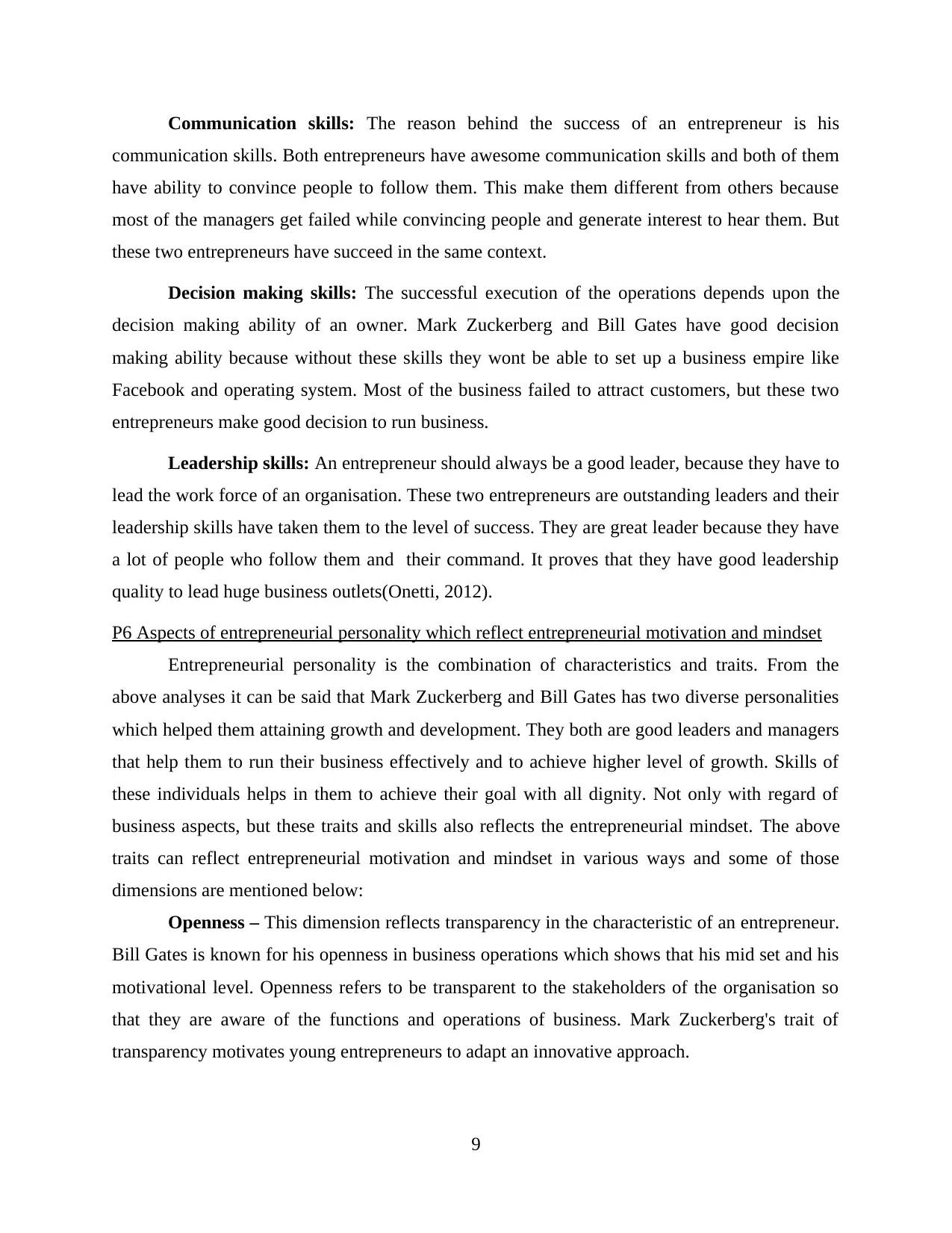
Communication skills: The reason behind the success of an entrepreneur is his
communication skills. Both entrepreneurs have awesome communication skills and both of them
have ability to convince people to follow them. This make them different from others because
most of the managers get failed while convincing people and generate interest to hear them. But
these two entrepreneurs have succeed in the same context.
Decision making skills: The successful execution of the operations depends upon the
decision making ability of an owner. Mark Zuckerberg and Bill Gates have good decision
making ability because without these skills they wont be able to set up a business empire like
Facebook and operating system. Most of the business failed to attract customers, but these two
entrepreneurs make good decision to run business.
Leadership skills: An entrepreneur should always be a good leader, because they have to
lead the work force of an organisation. These two entrepreneurs are outstanding leaders and their
leadership skills have taken them to the level of success. They are great leader because they have
a lot of people who follow them and their command. It proves that they have good leadership
quality to lead huge business outlets(Onetti, 2012).
P6 Aspects of entrepreneurial personality which reflect entrepreneurial motivation and mindset
Entrepreneurial personality is the combination of characteristics and traits. From the
above analyses it can be said that Mark Zuckerberg and Bill Gates has two diverse personalities
which helped them attaining growth and development. They both are good leaders and managers
that help them to run their business effectively and to achieve higher level of growth. Skills of
these individuals helps in them to achieve their goal with all dignity. Not only with regard of
business aspects, but these traits and skills also reflects the entrepreneurial mindset. The above
traits can reflect entrepreneurial motivation and mindset in various ways and some of those
dimensions are mentioned below:
Openness – This dimension reflects transparency in the characteristic of an entrepreneur.
Bill Gates is known for his openness in business operations which shows that his mid set and his
motivational level. Openness refers to be transparent to the stakeholders of the organisation so
that they are aware of the functions and operations of business. Mark Zuckerberg's trait of
transparency motivates young entrepreneurs to adapt an innovative approach.
9
communication skills. Both entrepreneurs have awesome communication skills and both of them
have ability to convince people to follow them. This make them different from others because
most of the managers get failed while convincing people and generate interest to hear them. But
these two entrepreneurs have succeed in the same context.
Decision making skills: The successful execution of the operations depends upon the
decision making ability of an owner. Mark Zuckerberg and Bill Gates have good decision
making ability because without these skills they wont be able to set up a business empire like
Facebook and operating system. Most of the business failed to attract customers, but these two
entrepreneurs make good decision to run business.
Leadership skills: An entrepreneur should always be a good leader, because they have to
lead the work force of an organisation. These two entrepreneurs are outstanding leaders and their
leadership skills have taken them to the level of success. They are great leader because they have
a lot of people who follow them and their command. It proves that they have good leadership
quality to lead huge business outlets(Onetti, 2012).
P6 Aspects of entrepreneurial personality which reflect entrepreneurial motivation and mindset
Entrepreneurial personality is the combination of characteristics and traits. From the
above analyses it can be said that Mark Zuckerberg and Bill Gates has two diverse personalities
which helped them attaining growth and development. They both are good leaders and managers
that help them to run their business effectively and to achieve higher level of growth. Skills of
these individuals helps in them to achieve their goal with all dignity. Not only with regard of
business aspects, but these traits and skills also reflects the entrepreneurial mindset. The above
traits can reflect entrepreneurial motivation and mindset in various ways and some of those
dimensions are mentioned below:
Openness – This dimension reflects transparency in the characteristic of an entrepreneur.
Bill Gates is known for his openness in business operations which shows that his mid set and his
motivational level. Openness refers to be transparent to the stakeholders of the organisation so
that they are aware of the functions and operations of business. Mark Zuckerberg's trait of
transparency motivates young entrepreneurs to adapt an innovative approach.
9
⊘ This is a preview!⊘
Do you want full access?
Subscribe today to unlock all pages.

Trusted by 1+ million students worldwide
1 out of 16
Related Documents
Your All-in-One AI-Powered Toolkit for Academic Success.
+13062052269
info@desklib.com
Available 24*7 on WhatsApp / Email
![[object Object]](/_next/static/media/star-bottom.7253800d.svg)
Unlock your academic potential
Copyright © 2020–2026 A2Z Services. All Rights Reserved. Developed and managed by ZUCOL.





